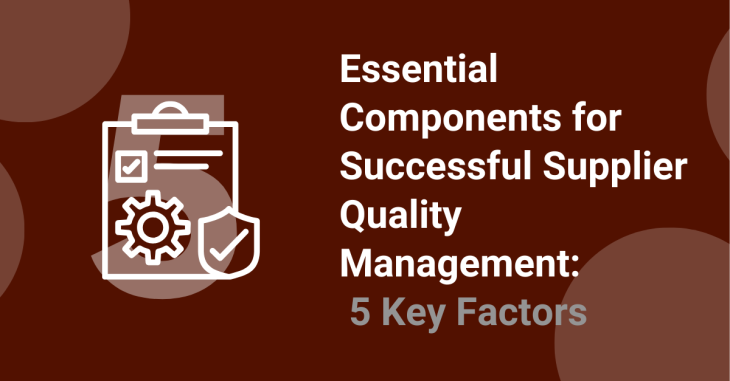What Are the Essential Elements for Successful Supplier Quality Management?

Supplier management is an ongoing job, not just something you do once. It involves a few important steps that, when done well, can help make your products better, increase your profits, keep your customers happy, and give your company a good reputation. Here’s what you need to include in your plan.
Quality Standards
Defining clear quality standards is the first step in effective supplier management. These standards, which often get overlooked, measure the quality of products received from suppliers. It’s important to clearly communicate these standards to suppliers so they know what’s expected. Without this clarity, your business might end up with lower-quality products and strained supplier relationships
Approval
Businesses need to establish procedures to approve suppliers. These procedures will differ depending on the level of risk and might involve self-assessments or audits. Each company should also create a thorough checklist outlining the necessary steps for approval. This checklist serves as a guide to ensure that everyone stays on track during the supplier onboarding process. It should clearly outline the responsibilities of each person involved, which often span across multiple departments. Additionally, there should be a separate checklist for qualifying vendors, assessing the effectiveness of their quality and safety systems.
Continuous Communication
Maintaining open channels of communication with suppliers ensures that everyone understands expectations, addresses issues promptly, and grasps any changes in requirements. A dedicated portal safeguards confidential documents and streamlines processes, saving time for both parties. Additionally, certain aspects of supplier management can be automated using plant management software; for example, setting up notifications for when a specific supplier certificate nears expiration, prompting them to upload a new document efficiently.
Data Analytics
Data analytics is vital for effective supplier quality management, enabling data-driven decisions to enhance efficiency. By analyzing metrics like product quality and delivery timeliness, businesses can pinpoint areas for improvement. Advanced tools such as predictive and prescriptive analytics offer proactive approaches. For instance, an automotive parts manufacturer can use analytics to identify top-performing suppliers and areas needing improvement in defect rates.

Audits
Audits serve as a proactive and efficient means of controlling supplier quality. They should be conducted regularly to confirm that the supplier’s operations align with the standards set by the purchasing company. Many facilities utilize audits to ensure that their suppliers maintain robust safety and quality protocols. While some larger companies may conduct their own audits (known as second-party audits), many rely on third-party audits provided by entities like GFSI schemes.
Rhythm Innovations:
At Rhythm, we understand the importance of streamlining the audit process for our clients. That’s why we offer management software designed to facilitate remote audits. Our platform enables suppliers to upload necessary documents and tasks, while internal teams can easily review and approve them within a single integrated system. This approach enhances efficiency and transparency, ensuring that supplier audits are conducted smoothly and effectively.
By following the key steps outlined above, including thorough approval processes, businesses can enhance product quality, boost profitability, maintain customer satisfaction, and uphold a positive reputation. Click here to read more about Supply Quality Management.





